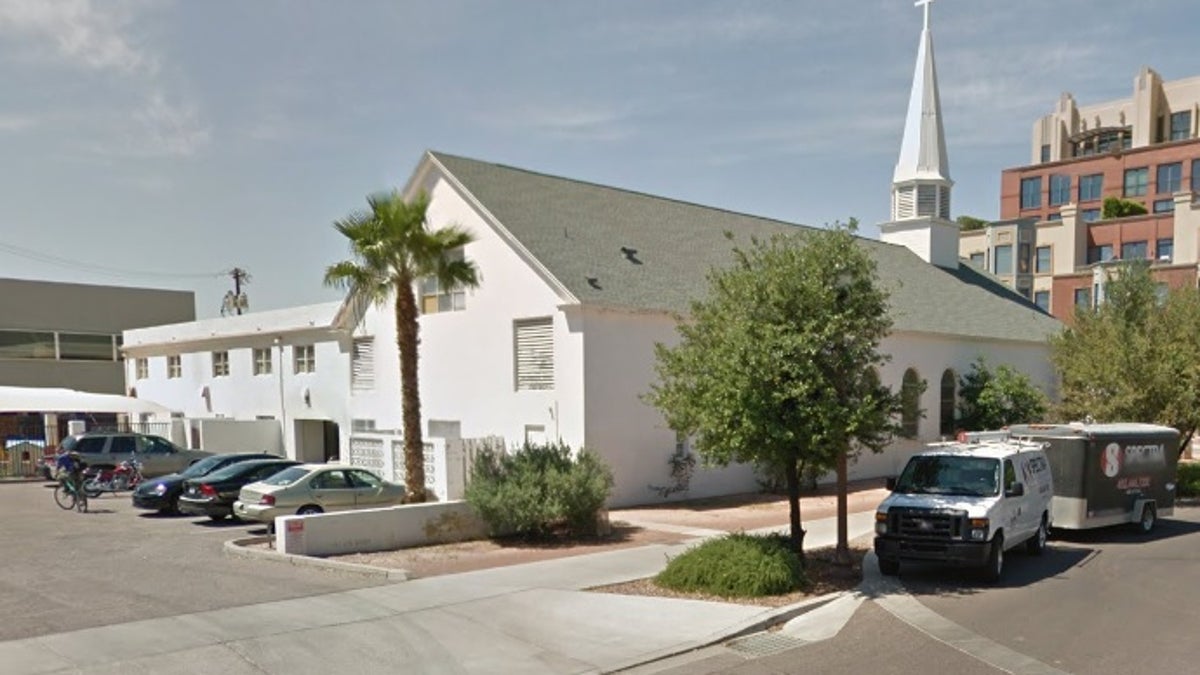
The First Congregational United Church of Christ in Tempe. (Google Street View)
While some churches in America have worshippers packed in the pews -- other churches have struggled to stay afloat.
The First Congregational United Church of Christ in Tempe, Arizona, just held its last service on Sunday due to low church attendance and an inability to financially support itself. The historic church opened in 1892 -- and in 1953, a new building replaced the original one.
Now a development company has snatched up the property -- leaving an uncertain future for this once-sacred ground.
TEXAS JUDGE SUED FOR BEGINNING COURTROOM SESSIONS WITH PRAYER
More From LifeZette.com
"Tearing the building down does not destroy my memories," said 75-year-old Jean Behrens, who had attended the church since she was seven years old, as The Arizona Republic reported. The publication noted that over 100 people -- amid a mood that was "solemn but hopeful" -- attended the final service at the church.
"Whether you come from near or far, your presence is a blessing," Rev. Talitha Arnold, senior minister at the United Church of Santa Fe, told the crowd.
WHERE OUR PRESIDENTS HAVE PRAYED
The closing of the Tempe church comes at a time when other houses of worship across the country have closed as well -- many Catholic parishes merged in recent years, for example, under the Vatican's direction, requiring the closing of beloved neighborhood churches. The closings in part reflect a shift in faith practices in this country, including those of millennials. Still, as a religious landscape study done recently by the nonpartisan data and analysis organization Pew Research Center found, 70.6 percent of the U.S. population identifies as Christian.
Among this group, evangelical Protestants make up the largest segment, at 25.4 percent, while Catholics make up 20.8 percent. Almost 23 percent of the American population identifies under an unaffiliated "religious nones" category.
"And the vast majority of these religious 'nones' (78 percent) say they were raised as a member of a particular religion before shedding their religious identity in adulthood," Pew noted.
The organization surveyed over 35,000 adults from all 50 states. The study was done in late 2014 and its results released in early 2015; it represented the second religious landscape study the group had done.
"Pew Research Center surveys consistently show that not all religious 'nones' are nonbelievers," the organization noted. "In fact, the majority of Americans without a religious affiliation say they believe in God. As a group, however, the 'nones' are far less religiously observant than Americans who identify with a specific faith."
While the research analysis from Pew concluded that younger generations are less religious than older folks in terms of rituals such as praying daily and attending church service weekly, "the study also suggests that in some ways Americans are becoming more spiritual."
"As older cohorts of adults (comprised mainly of self-identified Christians) pass away, they are being replaced by a new cohort of young adults who display far lower levels of attachment to organized religion than their parents' and grandparents' generations did when they were the same age," Pew noted.
For example, of the youngest group of millennials -- meaning those born from 1990 to 1996 -- 39 percent say they pray daily. Of the silent generation (those born from 1928 to 1945), 67 percent pray daily, while 61 percent of baby boomers (those born 1946 to 1964) pray daily. Of millennials born from 1981 to 1989, 27 percent say they attend church services at least weekly -- compared with 51 percent of the silent generation.
A recent study by JAMA Internal Medicine, a peer-reviewed medical journal, found that regular church attendance could increase lifespan in women.
Also, past research has shown that a father's church attendance plays a big role in whether or not that parent's children attend church when they are grown.








































